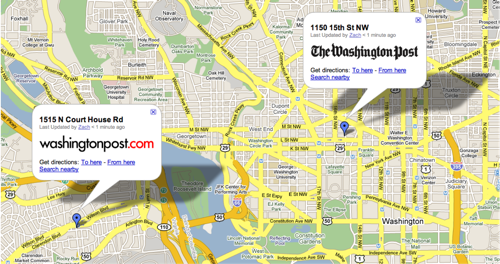
The Washington Post reached across the Potomac River to name one of its managing editors today, indicating that the newspaper may be closer to merging its print and digital operations. Elizabeth Spayd is currently editor of washingtonpost.com, which operates out of Arlington, Va., in an awkward split that has never served the Post well. She admitted as much to me in an interview this fall, calling the arrangement “far less than optimal.”
Spayd, who was previously an editor on the print side of the river, will now return to Washington as managing editor for hard news. (Raju Narisetti was named managing editor for the feature sections.) But she will leave behind the programmers, producers, online editors, and a few writers who compose the web staff in Arlington. In announcing today’s move, Post executive editor Marcus Brauchli focused on Spayd’s experience in both mediums but didn’t mention the paper’s ongoing efforts to merge its two newsrooms. This is what Spayd had to say about those plans when we spoke on October 22:
We want to make sure that we do it right, so we’re not going to be merged by next month, but we’ve actively begun that process, and we’re gathering information outside our newsroom, and a couple others went on these trips that have been written about, going to the Telegraph and the New York Times, the Guardian, BBC, looking at other newsrooms and figuring out how they’ve done it and try to apply the best of that to the Post newsroom. […] If we were going to move downtown, then there’s a certain amount of renovation that needs to take place to make that physically possible and actually happen in a way that makes sense structurally. But that’s also not right around the corner. But I do think that there’s space in the building.
In a wonderful and scathing piece last year, Erik Wemple of the Washington City Paper laid bear the tensions and inefficiencies between the Post’s two newsrooms. I asked Spayd about that article, and she said.
I think there were some legitimate points in there. I think you could see in that article that as much as we have come closer together in terms of cooperating with each other and working together, there’s still tension in the relationship, and there’s still miscommunication. And so partly because of that — that, and our effort to work more efficiently — we are trying to merge the two newsrooms.
The Post’s leadership has been in flux over the past year, beginning with the appointment of Katherine Weymouth as chief executive of Washington Post Media, becoming — believe it or not — the first publisher to oversee both the print and online operations of the newspaper. Spayd said that was when the Post began formulating plans to merge the print and digital newsrooms. In July, Marcus Brauchli was named executive editor of the Post, overseeing both newsrooms, and later this month, the executive editor of washingtonpost.com, Jim Brady, is stepping down. It remains to be seen if that all change will speed or impede these long overdue reforms.
And if you’re wondering why the Post, in 1996, chose to launch washingtonpost.com